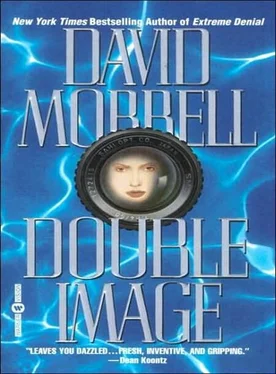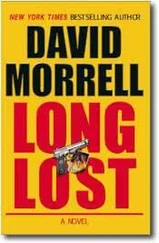“No!” Thrusting Tash aside, Coltrane reached his good arm toward Jennifer to pull her up.
The punch to his wounded shoulder drove him nearly insane with anguish. Seeing Tash try to hit him a second time, he managed to block the blow, but not without further pain to his wound.
“I can’t hold on!” Jennifer shouted.
But Coltrane couldn’t pull her up. He had to let go and defend himself against Tash, who lifted a heavy flowerpot to throw at him as she had at Walt. The effort to raise the pot above her head tilted her off balance, and when Coltrane pushed her as hard as he could, she hit the railing, so top-weighted that when he slammed her shoulders, she, too, went over the side.
Jennifer jerked. “She grabbed me! I can’t hang on!”
In a rush, Coltrane leaned over the side and slung his good arm under Jennifer’s chest, straining to support her weight. Below her, he saw Tash dangling from Jennifer’s ankles, the flames from both levels roaring up at her. Losing his hold, desperate, he tested his wounded arm, using it to try to pull Jennifer up. Blood pulsed. His injured muscle failed.
“No!” He strained harder with his good arm, feeling Jennifer slip. All the while, he stared down at Tash, who clawed her way up Jennifer’s legs, almost to her knees.
Coltrane wept with the effort to keep Jennifer from falling.
Tash groped higher.
Jennifer jerked her right leg free and kicked.
Tash reached up.
Jennifer kicked again.
“Why… don’t… you” – Jennifer kicked harder, and Coltrane couldn’t help thinking about Walt’s last words to Tash and where Tash’s mother had said she wanted her – “go… to… hell.”
As Coltrane felt Jennifer slipping away from him, Jennifer gave one last kick, and Tash lost her grip, screaming, plummeting into the flames below. The roar of the fire was so intense that Coltrane couldn’t hear the impact of her body hitting the patio two levels down.
Jennifer felt weightless. “Hang on to me! Don’t let go!”
“I’m trying as hard as I can!”
Jennifer pulled herself toward him. “My shoes are on fire!”
She struggled upward, Coltrane lifting, and abruptly they were sprawled on the balcony, Coltrane ignoring the sharp misery of his wound, burning his hands as he yanked off Jennifer’s smoking shoes and threw them away.
But flames filled the stairway to the bedroom. So weak that they could hardly walk, they wavered toward the section of the balcony farthest from the flames. From there, they had a view of the flashing lights of emergency vehicles in front of the house, of the crowd that had gathered and firefighters spraying water at the blaze.
A woman in the crowd shouted, “My God, someone’s up there!”
Two firemen stared toward the upper balcony, turned off the hose they had trained on the house, and ran toward the ladder truck, raising it to save the two figures they had seen.
FIRE PURIFIES, but how, Coltrane wondered, can you incinerate your mind? The increasing traumas of the previous two months had so numbed him that only after surviving the final horror did he begin to understand the full extent of his psychic damage. The rational part of him had grieved over the murders of his two closest friends and of his grandparents, but the ir rational part, he came to realize, had never acknowledged that those murders had occurred, that those loved ones were lost to him forever. Those conflicting parts seemed to be reacting to separate universes, and in one of those universes, the murders couldn’t possibly have occurred, just as Coltrane couldn’t possibly have been hunted by Dragan Ilkovic. So, if those events couldn’t have occurred, they hadn’t occurred. Otherwise, he would surely have gone insane.
Dragan Ilkovic had seemed the epitome of evil, but then Coltrane had encountered Tash Adler, her malignance existing on such an unimaginably primal level that it had shocked away the numbness created by what Ilkovic had done to him. He wept without warning. He couldn’t sleep for fear of nightmares. He needed all his concentration to explain repeatedly to the police and the fire investigators what had happened in his house that night and the events that had led up to it.
When you reach absolute bottom, Coltrane told himself, when you can’t possibly fall any further and deeper, you have to start climbing. In that way, Tash had done him a favor. By setting fire to the house that had once belonged to Rebecca Chance and Randolph Packard, she had destroyed part of a festering past that had taken possession of him.
Similarly, the money with which Coltrane had purchased the house was his only legacy from his hated father, and although Coltrane’s insurance company would reimburse him for the devastation of the property, he had the sense that the money had been cleansed, that the legacy, too, had been destroyed in the fire. He planned to give some of it to Greg’s widow and the rest to various charities. He refused to rebuild the house. He put the lot up for sale.
But there was one other element of the past that he had to deal with, and on a balmy day a month later, he drove to the trailer court in Glendale, where he steered down the lane past the dilapidated playground where his mother had once pushed him in a swing. He knocked on the door of the battered trailer where he and his mother had once lived and where his father had shot his mother and then committed suicide. He knocked several times, but the elderly black woman didn’t answer.
“Mister, she don’t live here no more,” a kid on a beat-up bicycle said.
“Do you know where she moved?”
“She don’t live anywhere. She dead.”
“Ah.” His spirit sank. “And who lives here now?”
“Nobody.”
He bought the trailer, had it towed away, and, without ever stepping into it again, watched as a huge metal press crumpled it, destroying it. He bought the best new trailer he could find, had it towed onto the trailer court, found the poorest family in the area, and arranged for them to live rent-free in the trailer. Then he paid for the old playground to be leveled and a shiny new one to take its place. It gave him tremendous satisfaction. He was cleaning house, he told himself, throwing out the past.
One aspect of the past that he was happy to retain, although he felt oddly distant from it, was the special edition of Southern California Magazine in which Randolph Packard’s classic series of photographs of L.A. houses in the twenties and thirties was mirrored by Coltrane’s updates of them, along with the photographs of people and places he had come in contact with during the odyssey of his assignment.
“They’re brilliant,” Jennifer said. “They’re going to give you a whole new direction for your career.”
“I feel as if someone else took them,” Coltrane said. “I’m a different person now.”
“Good. I wouldn’t want you to become too complacent.” Her tone was teasing.
“I know one thing. I’ll never take another photograph that doesn’t make me appreciate being alive and part of the world.”
“Like this photograph?”
“Especially.”
The photograph they were looking at showed a wistful, frightened, but determined young woman with wan cheeks, sunken eyes, and a scarf over her head that concealed the baldness that her chemotherapy treatments had caused. The setting sun toward which she peered was a metaphor for the declining days of her life, but the last moments of that setting sun made her face radiant. Her name was Diane Laramy, and Coltrane had taken that photograph on the day he and Jennifer had set out to find the first of the houses that Packard had photographed, Rudolph Valentino’s (who, although he hadn’t known it, had at the time himself been in the sunset of his life).
Читать дальше












